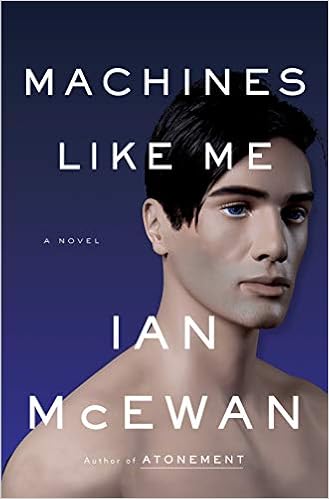I always look forward to reading an Ian McEwan novel; unfortunately,
this one was disappointing.
Charlie Friend is a 32-year-old man drifting purposelessly through
life. He has no gainful employment;
instead, he plays the stock market online, making just enough to survive. When he inherits a considerable sum of money,
he uses it to purchase Adam, a “manufactured human with plausible intelligence
and looks, believable motion and shifts of expression” (2). Wanting to pursue a romantic relationship
with Miranda, his upstairs neighbour, Charlie suggests the two become
co-parents of a sort and allows her to choose half of Adam’s personality
traits. Adam has access to everything on
the internet and his intellect soon surpasses that of the humans with whom he
has contact, but he has an uncompromising, fixed notion of right and
wrong. Obviously, problems arise.
The novel is set in London in an alternate 1982. In this world, England loses the Falklands
War, JFK survived a Dallas assassination attempt, Joseph Heller wrote Catch-18, the Beatles have reunited, and
Jimmy Carter is serving a second term as U.S. president. Most importantly, Alan Turing is alive and
his work has led to the creation of humanoids like Adam which are virtually
indistinguishable from humans: “Alan
Turing himself had often said and written in his youth that the moment we
couldn’t tell the difference in behaviour between machine and person was when
we must confer humanity on the machine” (91).
Conflicts are inevitable between the three main characters because
Charlie and Miranda are morally compromised whereas Adam has inflexible values. Charlie came close to going to prison for tax
fraud and Miranda has a secret that is hinted at in Adam’s initial warning that
she may be “’A systematic, malicious liar’” (32). On the other hand, Adam is programmed to
insist that truth is everything; for him, a lie is a lie regardless of
extenuating circumstances. Turing points
out that Adam cannot differentiate little white lies though “’social life teems
with harmless or even helpful untruths’” (329).
Adam makes decisions based on logic and reason, but humans tend to be
irrational, impulsive and often contradictory.
Turing argues that humanoids may be “’ill-equipped to understand human
decision-making, the way our principles are warped in the force field of our
emotions, our peculiar biases, our self-delusions and all the other
well-charted defects of our cognition’” (324).
The novel examines the ethics of artificial intelligence. Early on, after feeling betrayed by Adam,
Charlie wonders, “The problem was that I had bought him, he was my expensive
possession and it was not clear what his obligations to me were, beyond a
vaguely assumed helpfulness” (95). And
what are humans’ obligations to humanoids?
Towards the end, Charlie takes an action which Turing suggests should be
considered a serious crime. There have
been many literary explorations of A.I. and I didn’t find McEwan’s observations
to be ground-breaking. Certainly, Adam’s
comment about the future, that “’With improvements over time . . . we’ll
surpass you . . . and outlast you’” (303) is not new.
I appreciated the discussions around literature. Sometimes, there was humour: Charlie has “limited literary background”
(235) and has “no habit with books” (239) so when Adam says, “’I’m desperate to
hear your thoughts about Hamlet,
about Shakespeare playing his father’s ghost in the first production. And in Ulysses,
in the Nestor episode, what about Stephen’s theory?’” Charlie can only reply, “’All
right . . . But you go first’” (219-110).
Sometimes, the reader is left to ponder the future of literature. Adam mentions that “’Nearly everything I’ve
read in the world’s literature describes varieties of human failure – of understanding,
of reason, of wisdom, of proper sympathies.
Failures of cognition, honesty, kindness, self-awareness; superb
depictions of murder, cruelty, greed, stupidity, self-delusion, above all,
profound misunderstanding of others.’”
Then he suggests that, “’But when the marriage of men and women to
machines is complete, this literature will be redundant because we’ll
understand each other too well. . . . I’m sure we’ll treasure the literature of
the past, even as it horrifies us. We’ll
look back and marvel at how well people of long ago depicted their own
shortcomings, how they wove brilliant, even optimistic fables out of their conflicts
and monstrous inadequacies and mutual incomprehension’” (161-162).
Though I hate to say this about a McEwan novel, I found parts of it to
be tedious. For example, there are long descriptions
of the revised timeline with repeated, detailed references to strikes and
protests. Likewise, the descriptions of
Turing’s work are needlessly detailed. Throughout,
there are tangents which should have been judiciously edited.
I cannot say that this is my favourite McEwan novel. It is a cautionary tale about A.I. but one that
has been told in various ways by many others.
Even the love angle I read about almost 30 years ago in He, She and It by Marge Piercy.

No comments:
Post a Comment